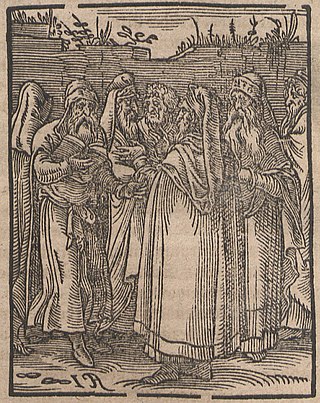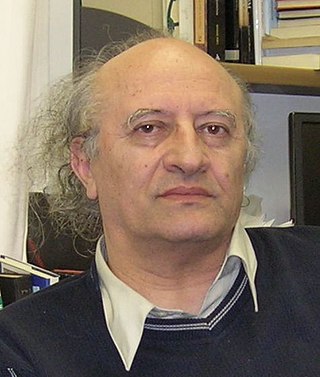
Kabbalah or Qabalah is an esoteric method, discipline and school of thought in Jewish mysticism. A traditional Kabbalist is called a Mekubbal. The definition of Kabbalah varies according to the tradition and aims of those following it, from its origin in medieval Judaism to its later adaptations in Western esotericism. Jewish Kabbalah is a set of esoteric teachings meant to explain the relationship between the unchanging, eternal God—the mysterious Ein Sof —and the mortal, finite universe. It forms the foundation of mystical religious interpretations within Judaism.

Hans Jonas was a German-born American Jewish philosopher. From 1955 to 1976 he was the Alvin Johnson Professor of Philosophy at the New School for Social Research in New York City.
John David Caputo is an American philosopher who is the Thomas J. Watson Professor of Religion Emeritus at Syracuse University and the David R. Cook Professor of Philosophy Emeritus at Villanova University. Caputo is a major figure associated with postmodern Christianity and continental philosophy of religion, as well as the founder of the theological movement known as weak theology. Much of Caputo's work focuses on hermeneutics, phenomenology, deconstruction, and theology.
Harry Austryn Wolfson was an American scholar, philosopher, and historian at Harvard University, and the first chairman of a Judaic Studies Center in the United States. He is known for his seminal work on the Jewish philosopher Philo, but he also authored an astonishing variety of other works on Crescas, Maimonides, Averroes, Spinoza, the Kalam, the Church Fathers, and the foundations of Western religion. He collapsed the artificial barriers that isolated the study of Christian philosophy from Islamic philosophy and from Jewish philosophy. Being the first Judaica scholar to progress through an entire career at a top-tier university, in Wolfson is also represented the fulfillment of the goals of the 19th-century Wissenschaft des Judentums movement.
Academic study of Jewish mysticism, especially since Gershom Scholem's Major Trends in Jewish Mysticism (1941), draws distinctions between different forms of mysticism which were practiced in different eras of Jewish history. Of these, Kabbalah, which emerged in 12th-century southwestern Europe, is the most well known, but it is not the only typological form, nor was it the first form which emerged. Among the previous forms were Merkabah mysticism, and Ashkenazi Hasidim around the time of the emergence of Kabbalah.
Henry Corbin was a French philosopher, theologian, and Iranologist, professor of Islamic studies at the École pratique des hautes études. He was influential in extending the modern study of traditional Islamic philosophy from early falsafa to later and "mystical" figures such as Suhrawardi, Ibn Arabi, and Mulla Sadra Shirazi. With works such as Histoire de la philosophie islamique (1964), he challenged the common European view that philosophy in the Islamic world declined after Averroes and Avicenna.
Richard Kearney is an Irish philosopher and public intellectual specializing in contemporary continental philosophy. He is the Charles Seelig Professor in Philosophy at Boston College and has taught at University College Dublin, the Sorbonne, the University of Nice, and the Australian Catholic University. He is the author of 23 books on European philosophy and literature and has edited or co-edited over 20 more. He was formerly a member of the Arts Council of Ireland, the Higher Education Authority of Ireland and chairman of the Irish School of Film at University College Dublin. He is also a member of the Royal Irish Academy. As a public intellectual in Ireland, he was involved in drafting a number of proposals for a Northern Irish peace agreement. He has presented five series on culture and philosophy for Irish and British television and broadcast extensively on the European media. He is currently international director of the Guestbook Project.
Hasidic philosophy or Hasidism, alternatively transliterated as Hasidut or Chassidus, consists of the teachings of the Hasidic movement, which are the teachings of the Hasidic rebbes, often in the form of commentary on the Torah and Kabbalah. Hasidism deals with a range of spiritual concepts such as God, the soul, and the Torah, dealing with esoteric matters but often making them understandable, applicable and finding practical expressions.

Alexander Altmann was an Orthodox Jewish scholar and rabbi born in Kassa, Austria-Hungary. He emigrated to England in 1938 and later settled in the United States, working productively for a decade and a half as a professor within the Philosophy Department at Brandeis University. He is best known for his studies of the thought of Moses Mendelssohn, and was indeed the leading Mendelssohn scholar since the time of Mendelssohn himself. He also made important contributions to the study of Jewish mysticism, and for a large part of his career he was the only scholar in the United States working on this subject in a purely academic setting. Among the many Brandeis students whose work he supervised in this area were Elliot Wolfson, Arthur Green, Heidi Ravven, Paul Mendes-Flohr, Lawrence Fine, and Daniel Matt.
Babette Babich is an American philosopher who writes from a continental perspective on aesthetics, philosophy of science, especially Nietzsche's, and technology, especially Heidegger's and Günther Anders, in addition to critical and cultural theory.
Shaul Magid is the Distinguished Fellow in Jewish Studies at Dartmouth College. From 2004-2018, he was a professor of religious studies and the Jay and Jeannie Schottenstein Chair of Jewish Studies in Modern Judaism at Indiana University as well as a senior research fellow at the Shalom Hartman Institute. From 1996-2004, he was a professor of Jewish philosophy at the Jewish Theological Seminary of America; he was chair of the Department of Jewish Philosophy from 2000-2004.

Paul Walter Franks is the Robert F. and Patricia Ross Weis Professor of Philosophy and Judaic Studies at Yale University. He graduated with his PhD from Harvard University in 1993. Franks' dissertation, entitled "Kant and Hegel on the Esotericism of Philosophy", was supervised by Stanley Cavell and won the Emily and Charles Carrier Prize for a Dissertation in Moral Philosophy at Harvard University. He completed his B.A and M.A, in Philosophy, Politics and Economics at Balliol College, Oxford. Prior to this, Franks received his general education at the Royal Grammar School, Newcastle, and studied classical rabbinic texts at Gateshead Talmudical College.
Dr. Jens Michael Zimmermann is a German-Canadian Christian philosopher, theologian, and professor who specializes in hermeneutics and the philosophical and theological roots of humanism.

The concepts and structures of Jewish Kabbalah have been used in the contemporary world to open comparative dialogue and cross-fertilization with modern secular disciplines in the Sciences and Humanities. This has been an uncommon phenomenon, since it requires wide internal understanding of both traditionalist Kabbalah and modern secular thought, and for social reasons Jewish modernity has seen isolation and entrenchment between the two. Skilled authorities in both traditions have included contemporary traditionalist Orthodox teachers of Kabbalah, as well as Neo-Kabbalistic and Academic scholars who read Kabbalah in a critical, universalist way.

Orthodox Jewish philosophy comprises the philosophical and theological teachings of Orthodox Judaism. Though Orthodox Judaism sees itself as the heir of traditional rabbinic Judaism, the present-day movement is thought to have first formed in the late 18th century, mainly in reaction to the Jewish emancipation and the growth of the Haskalah and Reform movements. Orthodox Jewish philosophy concerns itself with interpreting traditional Jewish sources, reconciling the Jewish faith with the changes in the modern world and the movement's relationships with the State of Israel and other Jewish denominations.
William Franke is an American academic and philosopher, professor of Comparative Literature at Vanderbilt University. A main exposition of his philosophical thinking is A Philosophy of the Unsayable (2014), a book which dwells on the limits of language in order to open thought to the inconceivable. On this basis, the discourses of myth, mysticism, metaphysics, and the arts take on new and previously unsuspected types of meaning. This book is the object of a Syndicate Forum and of a collective volume of essays by diverse hands in the series “Palgrave Frontiers in Philosophy of Religion”: Contemporary Debates in Negative Theology and Philosophy. Franke's apophatic philosophy is based on his two-volume On What Cannot Be Said: Apophatic Discourses in Philosophy, Religion, Literature, and the Arts (2007), which reconstructs in the margins of philosophy a counter-tradition to the thought and culture of the Logos. Franke extends this philosophy in an intercultural direction, entering the field of comparative philosophy, with Apophatic Paths from Europe to China: Regions Without Borders. In On the Universality of What is Not: The Apophatic Turn in Critical Thinking, Franke argues for application of apophatic thinking in a variety of fields and across disciplines, from humanities to cognitive science, as key to reaching peaceful mutual understanding in a multicultural world riven by racial and gender conflict, religious antagonisms, and national and regional rivalries.

Moshe Idel is a Romanian-born Israeli historian and philosopher of Jewish mysticism. He is Emeritus Max Cooper Professor in Jewish Thought at the Hebrew University, Jerusalem, and a Senior Researcher at the Shalom Hartman Institute.

Brian Treanor is the current Casassa Chair in Social Values, Professor of Philosophy in the Bellarmine College of Liberal Arts and the academic director of the Academy of Catholic Thought & Imagination at Loyola Marymount University. He received his Ph.D. from Boston College where he studied with Richard Kearney and Jacques Taminiaux.







